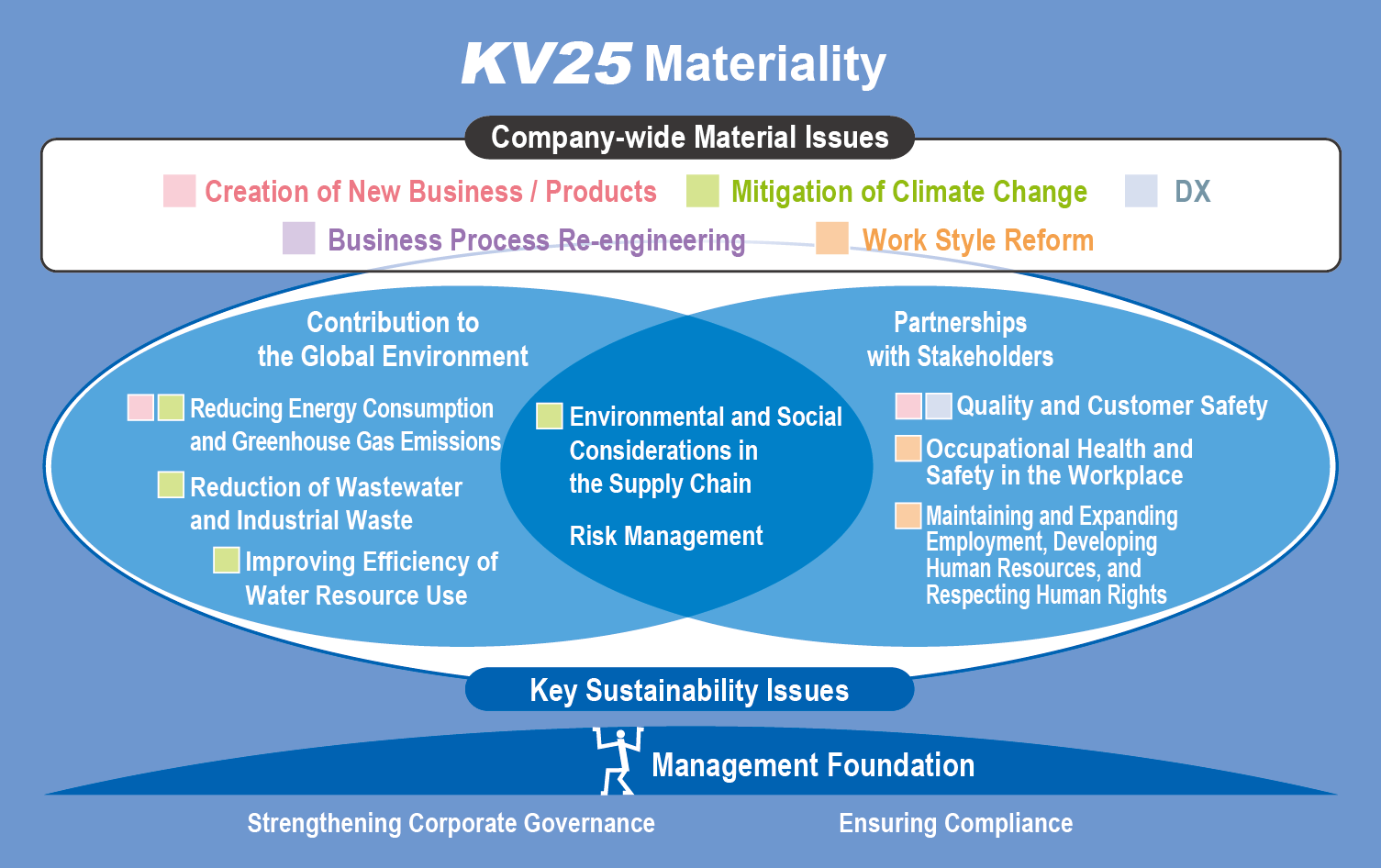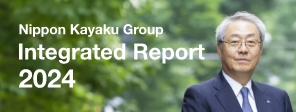| Most important issues for corporate survival |
Ensuring Compliance |
 |
- Exercise thorough compliance, which is a basic principle for conducting corporate activities, and engaging in fair business operations
- Maintain and enhance an open corporate culture with a high sense of ethics
|
Number of serious compliance violations*1 |
0 |
0 |
0 |
- No serious compliance violations.
- This financial year's compulsory compliance training on Mental Flexibility delivered to all domestic Group companies.
- Discussions held and options explored with overseas Group companies yet to install a compliance whistleblowing consultation service.
|
| Compliance training rate |
100% |
97% |
96% |
| Percentage of group companies with compliance / whistleblowing hotlines |
100% |
83% |
83% |
| Strengthening Corporate Governance |
- Strengthen corporate governance of the entire group and manage in a highly transparent and sound manner
|
Number of times that the assessment on the effectiveness of the Board of Directors meetings is evaluated |
Once per year |
1 |
1 |
- We have set up a Board of Directors Effectiveness Evaluation Survey, grasped the current situation, extracted relevant issues and devised an action plan as part of current improvement efforts.
- Female independent outside board member selected.
- Female Standing auditor selected.
- Human Resources Development Policy and Inside Environment Preparation Policy established.
|
| Number of times internal business audits are performed by the Audit Division |
60 times in four years |
22 |
17 |
| Most important issues |
Quality and Customer Safety |
 |
- Enhance our quality control and quality assurance systems by continuously improving our quality management system and ensuring thorough quality-related governance
- Implement quality management, improve production efficiency and reduce process abnormalities through digitalization
|
Number of serious complaints by customers*2 |
0 |
1 |
0 |
- Quality Fraud Prevention-related seminar on Understanding the Essence of Quality Compliance developed for our Product Quality Month (November).
- The post-seminar survey (120 respondents) yielded good results.
Satisfaction level: Extremely satisified or satisfied: 78%
Degree of understanding: Very easy to understand/ For the most part easy to understand: 90%
|
| Number of serious quality process abnormalities in processes*2 |
0 |
1 |
0 |
| Environmental and Social Considerations in the Supply Chain |
    |
- Practice supply chain management with consideration for environmental and social aspects, based on the Sustainable Procurement Guidelines
|
Response rate for confirmation of consent to Sustainable Procurement Guidelines |
(Non-consolidated) 90% |
(Non-consolidated) 99% |
(Non-consolidated) 91% |
- Sustainable Procurement Guidelines-based survey sent out to suppliers making up the top 90% of our purchases in FY2021 and all new suppliers in FY2022 and FY2023 (371 companies in total). 338 companies consented to the Guidelines.
- As the survey responses revealed no supplier problems with human rights and environmental issues, there was no need to send out Requests for Improvement.
|
| Formulation and implementation of improvement plans using questionnaires to suppliers |
(Non-consolidated) Disclose progress |
- |
Published in Topics |
| Most important issues |
Reducing Energy Consumption and Greenhouse Gas Emissions
Reduction of Wastewater and Industrial Waste
Improving Efficiency of Water Resource Use |
     |
- To achieve our FY2030 Environmental Targets by promoting energy-saving and global-warming response initiatives.
- To extract issues and clarify our strategies in order to achieve carbon neutrality by FY2050.
|
Greenhouse gas emissions
(Scope 1+2) |
(Target achieved in FY2030)
Under 70,598 tons (a reduction of over 46% on FY2019)
(Target achieved in FY2023)
Under 115,715 tons |
108,301 tons |
102,704 t-CO2 |
- Promotion of MFCA and Solar Power Generation PPA Models sequentially introduced.
- c. 24% reduction in industrial waste produced compared with FY2022.
- Our development status situation for environmentally-conscious products and technologies is as reported below.
[Safety Systems Business]
Development of a lighter cylinder-type inflator and green propellant MGG.
[Polatechno Business]
Reductions in waste treatment energy and total waste produced stemming from improvements to production process and product design.
[Functional Materials Business]
Pilot experiments performed on aircraft-oriented CFRP/GFRP thermosetting resin prototypes with development potential.
Development of a high-temperature resistant, high-reliability thermosetting resin from biomass materials.
[Color Materials Business]
Development of industrial inkjets (for coated paper and soft packaging).
Expanded sales of non-phenol developer for thermal paper.
Market debut and expanded sales for PLA (biodegradable) dye for fiber processing.
[Catalysts Business]
Promoting joint-research of catalysts used to manufacture hydrogen.
Materials informatics techniques used to develop catalysts which can contribute to lowering amounts of raw materials used and improved yields from target objects.
Development of catalysts to help manufacture basic chemicals such as propylene from biomass materials.
[Pharmaceuticals Business]
Environmentally-conscious wrapping initiatives started.
|
| VOC emissions |
(Non-consolidated) Disclose results |
(Non-consolidated) 38.7 tons |
(Non-conslidated) 32.9 tons |
| COD emissions |
(Non-consolidated) Disclose results |
(Non-consolidated) 171.8 tons |
(Non-consolidated) 210.9 tons |
| Total waste output |
(Non-consolidated) Disclose results |
(Non-consolidated) 27,621 tons |
(Non-consolidated) 20,974 tons |
| Recycling rate |
(Non-consolidated) 80% or higher |
(Non-consolidated) 85.0% |
(Non-consolidated) 83.8% |
| Zero emission rate |
(Non-consolidated) 1% or less |
(Non-consolidated) 0.8% |
(Non-consolidated) 0.7% |
| Goal setting in line with SBT and consideration and implementation of specific measures |
Disclose progress |
Gained an A-rating on CDP (Climate Change)
Scope 3 Calculations: Implementing improvements to accuracy |
Medium-term Environmental Targets revised to 1.5℃ scenario |
| Disclosure in line with TCFD recommendations |
Disclose progress |
Information disclosed |
Information disclosed |
| Develop products and technologies with consideration for environmental issues |
Disclose progress |
Published in Topics |
Published in Topics |
| Important issues |
Occupational Health and Safety in the Workplace |
  |
- Strengthen the foundation for safe operation by thoroughly enforcing basic rules on safety and health and improving equipment and work procedures
- Implement health and productivity management and provide a workplace environment with a healthy work-life balance where employees can work with enthusiasm
|
Number of serious accidents*3 |
0 |
0 |
0 |
- No accidents requiring time off work at business sites and partner companies across Nippon Kayaku alone.
- Health and Productivity Management certification gained.
- Although our overall target for annual paid leave was met, the manager take-up rate was slightly below target. We will continue to set up Paid Holiday Promotion Days, and promote them both via our intranet and through having human resource managers on every business site proactively informing employees. From the next financial year, we are also planning to set up a new initiative involving Personalized Paid Annual Leave Take-up Declarations.
- We are maintaining our 100% take-up rate for periodical health checks.
- We conducted our first ever engagement survey and provided feedback on the results. We will continue this survey from the next financial year onwards as part of our planned cycle of visualizing organizational conditions, drawing up an action plan and promoting its implementation.
|
| Acquisition of certifications under the Certified Health & Productivity Management Outstanding Organizations Recognition Program (Large Enterprise category) |
(Non-consolidated) Continued certification |
(Non-consolidated) Gained FY2023 certification as a Health and Productivity Management Organization (Large Enterprise Category) |
(Non-consolidated) Certified status renewed |
| Percentage of paid leave taken |
(Non-consolidated) 70% or higher |
(Non-consolidated) 63.7% |
(Non-consolidated) 72.8% |
| Percentage of employees who take mental health training |
(Non-consolidated) 100% |
(Non-consolidated) 100% |
Year 1 of our 3-year plan has proceeded as intended |
| Percentage of employees receiving regular health checkups |
(Non-consolidated) 100% |
(Non-consolidated) 100% |
(Non-consolidated) 100% |
| Ascertaining and improving employee satisfaction through questionnaire surveys |
(Non-consolidated) Disclose progress |
- |
Published in Topics |
| Important issues |
Maintaining and Expanding Employment, Developing Human Resources, and Respecting Human Rights |
    |
- Promoting diversity and inclusion through the recruitment of diverse human resources, effective HR assignment and exchanges
- Pass down and strengthen technical capabilities in monozukuri (manufacturing) and achieve globalization in human resources through ongoing human resource development
- Engage in business operations that pay care and consideration to the human rights of employees and all other people involved in the supply chain
|
Percentage of female employees in management posts*4 |
(Non-consolidated) 10% or higher |
(Non-consolidated) 9.0% |
(Non-consolidated) 8.8% |
- We have encouraged more women to challenge for managerial positions through promoting both training aimed at female managers and participation in career-support sessions.
- From the first conversations about work contents to the preparation of the workplace environment, we have incorporated specialist support in our quest to promote employment for people with disabilities and widen their job opportunities. Going forward, with one eye on future increases in statutory employment percentage rates, we will further expand work opportunities for the disabled, and establish a fixed support system as we advance our workplace preparations to help disabled employees succeed.
- Online training delivered on Business and Human Rights, and Risks Requiring Priority Measures as Identified by Nippon Kayaku Group Employees.
- Nippon Kayaku Group Human Rights Policy revised.
- The Top 3 Nippon Kayaku Group Risks Requiring Priority Measures have been identified by the Sustainable Management Meeting as: ① Power harrassment, ② Excessive overtime and long working hours, and ③ Privacy rights. With respect to these three, we have collectively disclosed our efforts on preventing, reducing and correcting negative impacts on human rights.
|
| Percentage of employees with disabilities |
(Non-consolidated) Achieve legal minimum employment rate |
(Non-consolidated) 1.98% |
(Non-consolidated) 1.93% |
| Amount invested in education and training per employee |
(Non-consolidated) Disclose results |
(Non-consolidated) 83,002 yen/person |
(Non-consolidated) 76,565 yen/person |
| Training hours per employee |
(Non-consolidated) Disclose results |
(Non-consolidated) 14.9 hours |
(Non-consolidated) 17.7 hours |
| Number of training sessions held on human rights |
Once or more per year |
1 |
2 |
| Human rights due diligence: human rights impact assessment rate |
(Non-consolidated) FY2022: 100%
(Consolidated) FY2025: 100% |
(Non-consolidated) Incomplete |
Human rights risk assessments and risks requiring priority measures identified in sessions laid on for Nippon Kayaku Group employees |
| Important issues |
Risk Management |
|
- Respond to various business-related risks and ensure business continuity by maintaining production systems, ensuring the proper procurement of raw materials, and strengthening measures against disasters
|
Implementation rate of risk control activities for business, etc., and top five risk control activities |
100% |
100% |
100% |
- "Risk Controls for the Top 5 Risks" activities conducted at Nippon Kayaku plants and all Group companies (based on trends of soaring raw material prices and increased supply disruption risks)
- Hearings conducted at domestic and overseas plants on the Top 5 Risks.
- BCP drills set up based on an earthquake scenario in the Kashima district, and a snow-damage scenario in the Joetsu region.
- BCP drills set up at China-based Group companies.
|
| Number of BCP drills conducted |
Once or more per year |
2 |
3 |




